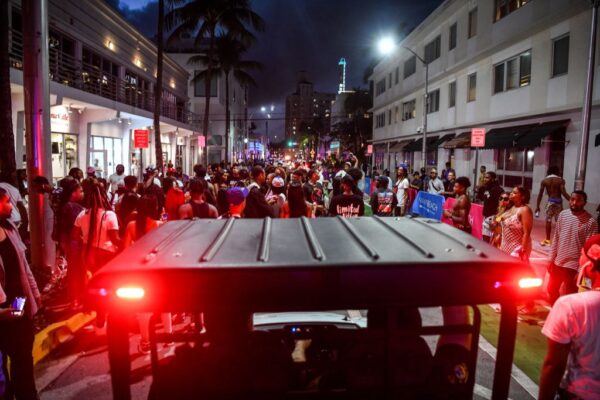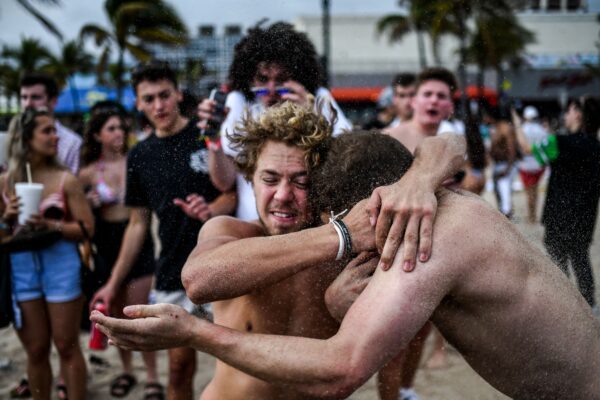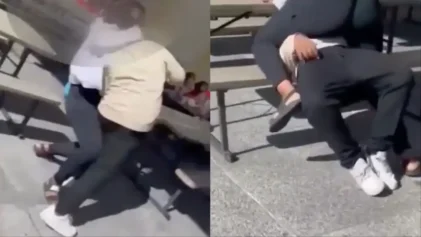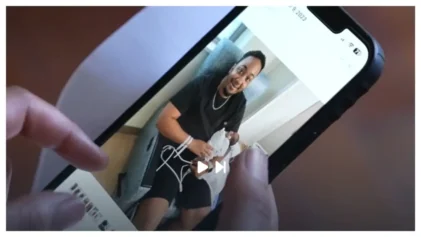Partying in Florida for spring break has been an American tradition as far back as the 1950s when novelist and English professor Glendon Swarthout captured the rowdy gatherings on beaches and streets of Fort Lauderdale in his book “Where the Boys Are.”

Swarthout’s novel was depicted in a movie with the same that shows droves of white college booze-fueled students taking over cities across Florida. Officials in the film refer to spring break gatherings as a celebration of the “rites of spring.”
In the late 1980s, MTV started broadcasting annual spring break coverage, featuring live performances and raunchy competitions in front of massive crowds of undergrads.
In recent years, Miami Beach, a barrier island city in Miami-Dade County, has been the destination for mostly Black spring breakers looking to celebrate time away from school in mid-February to April. Miami Beach officials on March 23 issued an emergency order “in response to excessively large and unruly spring break crowds.”
Critics of the order said it is an “overreaction” to incidents of violence during the largely peaceful break.
Miami Beach Commissioner Ricky Arriola told reporters the order was necessary because of spring breakers’ behavior.
“It’s a particular crowd that comes here particularly this time of year and doesn’t behave with normal civil rules of conduct,” Arriola told The New York Times. “They settle differences with fighting, stabbing, shootings and mayhem.”
Emergency declarations are used by local governments to allow officials to lift restrictions and expedite response to an emergency.
It is often used during natural disasters and most recently used in states and local municipalities nationally to take immediate action to combat the COVID-19 pandemic. The order allows the city to implement a curfew and limit alcohol sales.
Miami Beach’s curfew is from 11:59 p.m. to 6 a.m. March 24 to March 28 in the most popular areas of the city, near the beach. Alcohol sales in stores are banned after 6 p.m. through March 26.
Miami Beach commissioners said the order serves to protect residents, tourists and police, pointing to two shootings on March 20 and March 21. Five people were injured and one shooting led to a stampede. The commissioners held a press conference the same weekend announcing the plan to make the declaration.

Miami Beach resident and civil rights lawyer Melba Pearson said the order was not needed.
“Everything I’ve observed has been peaceful, just kids trying to have a good time, that’s all I’ve been seeing,” Pearson told The Miami Herald. “It’s an absolute overreaction. Not to trivialize people being harmed or shot, but you have to have a balanced approach to issues of criminal justice and law enforcement.”
Miami Beach officials in the order said police have responded to at least six reports of gunfire, and at least nine officers have been injured. More than 370 officers were deployed the weekend of the stampede, including 60 officers from a multi-agency gang task force.
From Feb. 18 to March 20, the officers have made 618 arrests, according to the city. It is unclear how many of the people detained were tourists or spring breakers. Reports show UFC fighter Jorge Masvidal was among those arrested. He was charged with battery for allegedly punching fellow UFC star Colby Covington.
Months before spring break, Miami Beach officials planned to take a softer approach, launching a campaign using social influencers with mantras such as: “Take care of our city and it will take care of you.”
Video from Miami Beach shows smaller crowds on the first night of curfew. Those who disobey the rules could be arrested and charged. Access to city-owned parking garages is closed at 11 p.m. under the order, and hotel guests arriving after curfew must show proof of reservation. The order also allows police to shut down streets at will and activate more license plate readers.
It is not the first time the city has taken aggressive measures in response to an influx of Black tourists. Last year, Miami Beach had an 8 p.m. curfew during spring break. There were reports of disorderly crowds and vandalism, and people jumped on police cars and partied in the streets.
As a result, the city commission passed a law that gives police more leeway to arrest people who get too close to them. It spurred litigation after it was used to arrest mostly Black people filming officers, the Miami Herald reported.
Miami Beach has also increased police presence and shut down streets during Urban Beach Week. The annual hip-hop festival draws hundreds of thousands of tourists to Miami Beach every Memorial Day Weekend. The city in recent years has tried to rebrand the holiday weekend with its own events.
Back in the 1950s, when Swarthout followed his students to Fort Lauderdale, Black people were not allowed on Miami Beach unless they worked there. Before integration, Black workers had to carry identification cards with their fingerprints embedded on them to gain access to the island.
“The only emergency is that Black people are on the beach,” said Stephen Hunter Johnson, a member of Miami-Dade’s Black Advisory Board. “I don’t understand how this town has been doing spring break for at least 25 years and can’t figure it out.”
Local businesses have also complained about the possible revenue loss because of the curfew, and at least two lawsuits have been filed against the city.


